|
Story originally published in DeSmog Attorneys representing a group of young people suing the United States government in a groundbreaking constitutional climate lawsuit are pressing a federal district court in Oregon to deny the Department of Justice’s attempts to quash the case before trial, citing the recent ruling out of Montana in favor of youth plaintiffs as a “persuasive” example of the importance of letting youth voices and climate science be heard at trial. In a filing with the U.S. District Court for the District of Oregon on Monday, attorneys with Our Children’s Trust – the Oregon-based nonprofit law firm spearheading youth-led constitutional climate litigation in the U.S. – pointed to last week’s historic decision in Held v. State of Montana as supportive of their request that District Judge Ann Aiken “set an immediate trial date” for their case against the federal government. That case, Juliana v. United States, seeks to hold the U.S. government accountable for perpetuating a fossil fuel-based energy system and worsening the climate crisis. First filed in 2015, Juliana is currently awaiting a ruling in the district court on the U.S. Department of Justice’s latest request to terminate the case. “The Held Order flies in the face of the arguments of the U.S. Department of Justice (“DOJ”) that a trial in Juliana is a waste of judicial economy,” the attorneys write in their filing, called a Notice of Supplemental Authority. It argues the Montana case shows “youths’ climate injuries from fossil fuel policies and practices are provable at a manageable trial” and that courts can provide relief in the form of declaring government policies and conduct to be unconstitutional. In a first-of-its-kind decision issued August 14, Judge Kathy Seeley in the First Judicial District Court of Montana ruled in favor of 16 young Montanans who put their state government on trial in June in what was the first constitutional climate trial in U.S. history. Judge Seeley found that the state had violated youth plaintiffs’ fundamental rights under the Montana constitution by enacting policies promoting fossil fuels and prohibiting consideration of climate change in fossil fuel permitting decisions, thereby contributing to dangerous climate change and environmental degradation. The ruling cited testimony presented at trial including youth plaintiffs’ personal accounts of how climate change impairs their health and quality of life, backed by experts explaining the science underlying these harms and linking it to government policies. “It’s the first decision that’s really tied tightly to the best available science on how we protect our climate system for young people,” Julia Olson, Our Children’s Trust executive director and chief legal counsel, said of Judge Seeley’s ruling during a Facebook webinar on Monday. “Hearing the expert witnesses and backing up everything we were saying with peer-reviewed scientific evidence, it was all just a really wonderful experience,” added 17-year-old plaintiff Eva Lighthiser of Livingston, Montana. In their Monday filing with the Oregon district court, Olson and co-counsels Phil Gregory and Andrea Rodgers explained that the ruling in the Montana case “recognized the relevance and suitability of climate science to judicial decision-making.” Judge Seeley not only recognized the “overwhelming scientific consensus” that the extraction and burning of fossil fuels are resulting in dangerous climate impacts, but that “every ton of fossil fuel emissions” only worsens these impacts. She even quoted the stark warning from the Intergovernmental Panel on Climate Change in its latest scientific assessment: “Climate change is a threat to human well-being and planetary health (very high confidence). There is a rapidly closing window of opportunity to secure a livable and sustainable future for all (very high confidence).” IPCC Report ‘Incredibly Important’ As Delta Merner, lead scientist at the Science Hub for Climate Litigation at the Union of Concerned Scientists, told DeSmog, the court’s recognition of the scientific consensus from the IPCC shows that climate science is relevant to court decisions. “It’s an incredibly important document to be using,” she said of the IPCC reports. “You can’t have junk science that is coming into these courtrooms.” During its defense, the state of Montana did not even try to dispute or discuss climate science; the state declined to call two of their three expert witnesses including climatologist-turned-climate-contrarian Judith Curry. “The state failed to put on any case at all,” said Patrick Parenteau, emeritus professor of law at Vermont Law and Graduate School. Similarly, the U.S. government may have a hard time defending their continued authorization of fossil fuel development when faced with evidence of climate science in a court of law. “The science is very clear,” Merner said. “Right now what we know scientifically is that reduction [of fossil fuels] is the primary way to reduce emissions.” The IPCC’s latest report says that climate mitigation calls for a “substantial reduction in overall fossil fuel use.” And yet the U.S. government continues to permit substantial oil and gas production and to support new fossil fuel infrastructure and extraction projects like the massive ConocoPhillips Willow drilling project in Alaska.
As the Juliana youth plaintiffs’ attorneys note in their filing with the Oregon district court, “thanks to the policies and practices of the last three administrations, Obama, Trump, and now Biden, the United States is today the largest producer of oil and gas in the world.” These federal policies and practices promoting fossil fuels, the Juliana case argues, contribute substantially to the climate crisis that is already harming young people, violating their constitutional rights such as rights to life, liberty and property. The case had twice been scheduled for trial but persistent government opposition ultimately derailed trial proceedings before a federal appeals court eventually dismissed the case in January 2020. But in June, Judge Aiken reactivated the case after attorneys for the youth plaintiffs revised their complaint and narrowed their requested relief, which set the case back on track towards trial. Eight years after the case was filed, Department of Justice lawyers are once again fighting to stop it from getting to trial. But the devastating impacts of the climate crisis – from horrific wildfires to disastrous floods and deadly heat – are only becoming more intense and the climate science demanding urgent action is becoming more irrefutable, Merner said. “As there continues to be delay tactics through various dismissal attempts or appeal processes, as time goes by, the reality of climate change is worsening,” she said. And the science and our understanding of it is getting stronger.”
0 Comments
Story originally published in DeSmog
As more than two dozen climate liability lawsuits by state and local governments against fossil fuel companies continue to progress, a case brought by the city and county of Honolulu could become the first to put Big Oil on trial. On Thursday, the Hawaii Supreme Court heard arguments on an appeal by the defendants, which include oil majors such as ExxonMobil and Chevron, to dismiss the suit – a move that a trial court rejected in March 2022. The hearing, which lasted just over an hour, marked the first time the court had been in session since the devastating wildfires in Maui. The session opened with a moment of silence for the victims, at that point numbering 111 confirmed fatalities – a number state officials say will surely rise. It’s not yet clear how much climate change has played a role in the Maui fire disaster, which was related to unusually windy and dry conditions on the island. Scientists say that global heating, driven primarily by fossil fuel combustion, has contributed to more arid conditions in many locales, including Hawaii, and made vegetation more flammable. The Thursday hearing centered on the fossil fuel defendants’ contention that federal law, not state, applies to the case. Honolulu’s lawsuit is similar to litigation against tobacco and opioid manufacturers, because it seeks to impose liability on fossil fuel companies for knowingly promoting and selling a harmful product, and lying about the harms to the public. Arguing for the oil companies, attorney Theodore J. Boutrous, Jr., of the firm Gibson, Dunn & Crutcher, stated that given the global nature of the climate problem, state law cannot apply. If Honolulu prevails in the case, Boutrous argued, “Hawaii tort law would become the policing mechanism for the entire world regarding marketing of oil and gas products.” He said the case belongs under federal law because it involves global greenhouse gas emissions, which the U.S. authorizes the Environmental Protection Agency (EPA) to regulate under the Clean Air Act. However, attorney Vic Sher of the law firm Sher Edling – which represents Honolulu as well as a handful of other municipal plaintiffs in climate lawsuits – countered that the federal Clean Air Act “does not provide a safe haven for international corporations to dissemble and lie about their products.” Because the oil and gas companies do business in Hawaii, Sher argued, they can be held accountable in Hawaii. “If they don’t want to be hauled into court in Hawaii, they could choose not to do business here,” he said. “This is a big case, and it’s an important case,” Sher stated in his concluding remarks, but “those factors don’t make this case either a federal case or one we’re not entitled to prove.” The court did not make any immediate ruling, but said it would take the matter under advisement. The Honolulu lawsuit was initially filed in Hawaii’s First Circuit Court in March 2020. The city and county brought state common law claims of nuisance, trespass, and failure to warn against Exxon, Chevron, Shell, BP, Marathon Petroleum, ConocoPhillips, and other oil and gas companies for allegedly concealing the true harms of their products on the climate system, as well as engaging in coordinated disinformation campaigns to stave off climate policy responses and protect profits. This deceptive conduct, the lawsuit contends, has made Honolulu more vulnerable to climate change impacts like sea level rise, coastal erosion, extreme heat, and severe storms and flooding. Honolulu wants the companies to help pay the costs of recovering from and adapting to these impacts, which are estimated to be on the order of billions of dollars. After the oil companies appealed the trial court’s decision denying their motions to dismiss the lawsuit, trial court Judge Jeffrey Crabtree issued a pause on most evidence-gathering in the case. However, his order allowed for “limited and necessary discovery” as well as actions to “lay the infrastructure or groundwork” for the discovery process to proceed promptly if the appeal fails. If Hawaii’s highest court does rule against the companies’ latest appeal, it will put the case on track towards comprehensive discovery – including interviews with key witnesses and obtaining internal oil industry documents – and a trial date. “It’s definitely the case to watch. It’s out in front of all the others,” said Patrick Parenteau, emeritus professor of law and senior fellow for climate policy at Vermont Law and Graduate School. Honolulu’s climate case, Parenteau told DeSmog, “has the best chance of getting to trial first” because it is furthest along procedurally among cases seeking to make Big Oil pay for steep climate-related costs incurred by local and state governments. A case bought by Massachusetts against ExxonMobil is also on track towards trial, and is starting the discovery process. The Massachusetts lawsuit is among a handful of climate cases charging oil companies with violating consumer fraud laws and not seeking to recover climate costs. In October 2020, Maui County also brought a climate liability lawsuit against fossil fuel companies. In its complaint, Maui noted that “wildfires are becoming more frequent, intense, and destructive in the County.” The oil companies in the Maui lawsuit have asked the state trial court to dismiss the case. A ruling from the Hawaii Supreme Court upholding the trial court’s order rejecting defendants’ bids to dismiss Honolulu’s case will likely diminish their chances of success. There is a pretty good chance the Hawaii Supreme Court could rule in Honolulu’s favor, according to Parenteau. “I’m expecting we’re going to see a fairly robust opinion in the case,” he told DeSmog. “The combination of what’s happening in Hawaii, factually, damage-wise, and the fact that I think you’ve got a progressive judiciary that is open to these kinds of claims, that’s a pretty good set of circumstances for a success.” Story originally published in DeSmog A Montana court ruled in favor of 16 young people who put their state government on trial in June in the first constitutional climate trial in U.S. history. In an order issued Monday, Judge Kathy Seeley in the First Judicial District Court of Montana found that the state had violated youth plaintiffs’ constitutional rights, including the right to a clean and healthful environment, because of Montana’s pro-fossil fuel policies, which require the state to disregard climate change and greenhouse gas emissions in environmental reviews. “As fires rage in the West, fueled by fossil fuel pollution, today’s ruling in Montana is a game-changer that marks a turning point in this generation’s efforts to save the planet from the devastating effects of human-caused climate chaos,” Julia Olson, chief legal counsel and executive director of Our Children’s Trust, a nonprofit law firm that represented the youth plaintiffs, said in a statement. “This is a huge win for Montana, for youth, for democracy, and for our climate. More rulings like this will certainly come.” The Held v. State of Montana case, first filed in 2020, argued that Montana’s longstanding actions and policies supporting fossil fuel development — despite clear knowledge of the climate consequences — contribute to environmental degradation and violate the young plaintiffs’ rights to a “clean and healthful environment.” Montana’s constitution explicitly grants that right, as do some other state constitutions, like Pennsylvania’s and New York’s. Montana’s constitution also extends it and other inalienable rights to its youngest citizens. During Montana’s 2023 legislative session, which ended in May, the Republican supermajority passed a number of bills that weaken environmental protections. This included a controversial amendment to the Montana Environmental Policy Act (MEPA) that some had called the “most aggressive” anti-climate bill in the nation. That law, House Bill 971, dubbed the “MEPA limitation,” expressly prohibited state agencies, including the Montana Department of Environmental Quality, from evaluating greenhouse gas emissions in environmental permits. As the Held case went to trial, the question of this statute’s constitutional compliance was front and center. In her decision, Judge Seeley left no doubt that H.B. 971 was “unconstitutional on its face.” Her order overturns it, as well as another related piece of new legislation, Senate Bill 557. This bill bars MEPA litigation brought against the state on climate grounds from thwarting or delaying any permitting or authorization. “This ruling, this case; it is truly historic. We are heard,” 18-year-old plaintiff Kian Tanner said in a statement. “Frankly the elation and joy in my heart is overwhelming in the best way. We set the precedent not only for the United States, but for the world.” Montana Democratic state Senator Mary Ann Dunwell, whose district covers eastern Helena, told DeSmog that the ruling sends a strong message to her Montana legislature colleagues who are climate deniers. “It states in our constitution that the legislature has a responsibility, it’s our job to make sure that we uphold that right to a clean and healthful environment,” she said. “The majority Republican legislature these past two sessions has violated that.” “To me it’s vindicating, this ruling is vindicating,” Dunwell added. “The youth had a strong case and frankly the state had a very weak one.” In its narrow defense presented in just one day, state attorneys steered clear of engaging in climate science. To the extent the state did discuss climate impacts, it claimed that Montana’s emissions “are simply too minuscule to make any difference.” The Montana attorney general’s office did not reply to a request for comment from DeSmog. The office sent a comment to Montana’s ABC/Fox News website stating that, “the ruling is absurd,” and the trial was a “weeklong taxpayer-funded publicity stunt” that showed Montana has “no impact on the global climate.” The comment noted the state will appeal. But Seeley’s ruling recognized the scientific fact that every additional ton of greenhouse gas pollution emitted exacerbates climate impacts. “Montana’s GHG [greenhouse gas] emissions and climate change have been proven to be a substantial factor in causing climate impacts to Montana’s environment and harm and injury to the Youth Plaintiffs,” she wrote. The decision further affirmed that Montana’s right to a clean and healthful environment includes climate, as a stable climate is “part of the environmental life-support system.” Inspiration for Similar Climate Lawsuits Professor Michael Gerrard, director of the Sabin Center for Climate Change Law at Columbia Law School, called the ruling “the strongest decision on climate change ever issued by any court.” “After a trial where climate scientists testified under oath and were subject to cross examination (very rare in itself), the court issued a 103-page decision that found that fossil fuel use is the principal cause of climate change, which is in turn causing serious health and environmental impacts that will continue to get worse,” he wrote in a statement emailed to DeSmog. He added that the court found that renewable energy, like wind, solar, and hydro, can economically substitute for fossil fuels. This ruling “may inspire similar lawsuits around the world,” Gerrard said. Another youth-led climate case spearheaded by Our Children’s Trust will be going to trial next summer in Hawaii, the scene of the deadliest wildfire disaster the United States has seen in more than a century. Like Montana, Hawaii also has the right to a clean and healthful environment embedded in its constitution, and this case involves climate pollution authorized by the state’s Department of Transportation.
“This [Montana] decision could have an impact on the OCT case pending in Hawaii, which is scheduled for trial in 2024 and it may well inspire other cases in states like Pennsylvania and New York with similar constitutional provisions,” Patrick Parenteau, professor of law emeritus and senior fellow for climate policy at Vermont Law and Graduate School, told DeSmog. “The [federal] Juliana case has inspired youth lawsuits in other countries like Germany, France, and Columbia, as well as the European Court of Human Rights, and this decision is sure to spur even more.” Climate lawsuits seeking to hold a state transportation agency and major fossil fuel producers accountable for contributing to the climate crisis are moving forward in Hawaii.
The state is currently reeling from devastating wildfires on the island of Maui that have destroyed the town of Lahaina and killed at least 93 people – the deadliest wildfire disaster the U.S. has seen in over a century. Scientists say global heating driven largely by fossil fuel combustion contributes to drying conditions that makes vegetation more flammable. Climate change generally enables fires to burn more intensely and over larger areas, and is an important factor in worsening the devastation from the Maui wildfires. While the lawsuits underway will not provide relief for this disaster, they are part of the larger global effort to hold governments and corporate polluters accountable for exacerbating climate harms. As climate journalist Amy Westervelt explains in a recent piece, “accountability isn't just ‘a’ climate solution, it actually has to be the first one.” Climate litigation is surging around the world and is a critical tool for advancing climate justice, according to a new report from UN Environment Programme (UNEP) and the Sabin Center for Climate Change Law. “People are increasingly turning to courts to combat the climate crisis, holding governments and the private sector accountable and making litigation a key mechanism for securing climate action and promoting climate justice,” UNEP Exective Director Inger Andersen said. In Hawaii, where the transportation sector is the largest source of greenhouse gas pollution in the state, a group of fourteen young people have brought a climate accountability lawsuit against the Hawaii Department of Transportation. By continuing to operate a carbon-intensive transportation system and not acting swiftly to slash transport emissions in line with Hawaii’s ambitious climate goals, HDOT is contributing to worsening climate change and violating the youth plaintiffs’ constitutional rights, including the right to a clean and healthful environment, the lawsuit contends. The youth-led case, Navahine F. v. Hawaii Department of Transportation, is headed to trial next summer. New trial dates were recently announced – June 24 to July 12, 2024 at the Environmental Court of First Circuit in Honolulu. It will be just the second constitutional climate case to go to trial in U.S. history, following the landmark trial in the Held v. State of Montana case in June 2023. Two other climate cases in Hawaii are also on track towards trial. These cases target major oil and gas companies such as ExxonMobil, Chevron and Shell, arguing the companies engaged in a longstanding climate disinformation campaign to protect profits and block or delay climate action. Plaintiffs Honolulu (city and county) and Maui (county) brought their cases in March and October of 2020, respectively, against fossil fuel defendants. The lawsuits are currently pending in Hawaii state court after surviving attempts from defendants to force the cases in federal court. Maui’s case is awaiting a decision on defendants’ motions to dismiss. Honolulu’s case is a bit further along as the state trial court has already denied defendants’ motions to dismiss; defendants have appealed and the Hawaii Supreme Court will hear the appeal this week on August 17. Climate-related disasters are increasingly wreaking havoc across the United States and around the world, and Hawaii is no exception. The islands are especially vulnerable to sea level rise, flooding, and severe storms, and they are also experiencing extreme heat, drought and deadly fires. In its complaint, Maui County referenced worsening wildfires as one of the climate impacts it is seeing. “Wildfires are becoming more frequent, intense, and destructive in the County,” the complaint states. The Center for Climate Integrity, which advocates for holding climate polluters accountable, says that Maui’s current wildfire disaster makes its lawsuit against oil and gas majors “increasingly relevant.” “Maui residents are currently suffering mass evacuations, the loss of loved ones and homes, and cultural and economic destruction that will be felt for years to come — it’s cruel to stick them with the bill to clean up and recover from a disaster made worse by Big Oil's lies,” CCI said in a post. “Maui communities have already paid more than enough; it’s time for Big Oil to stand trial for their climate deception.” |
Archives
July 2024
Categories |
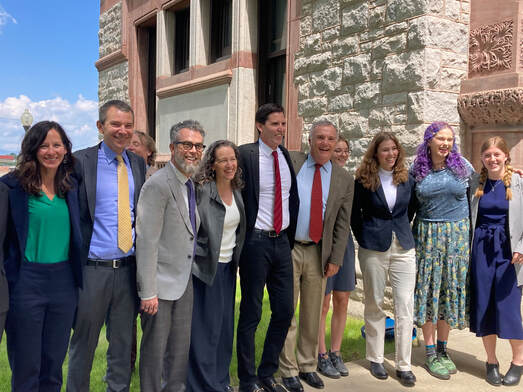
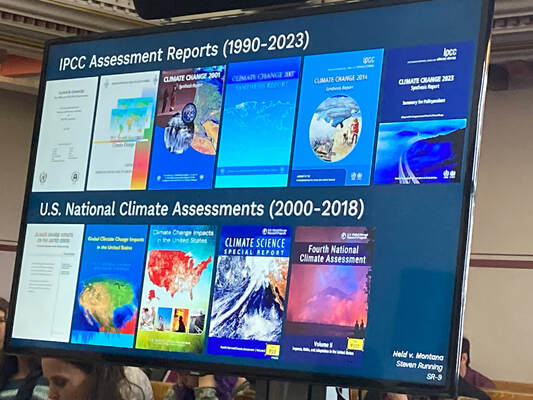
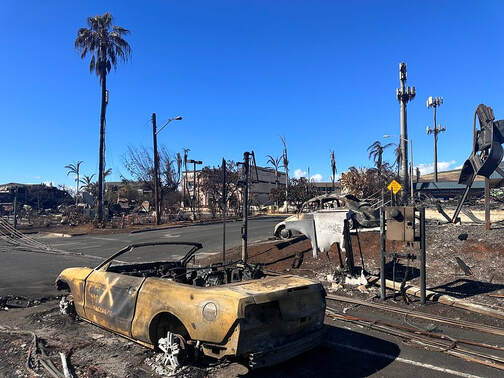
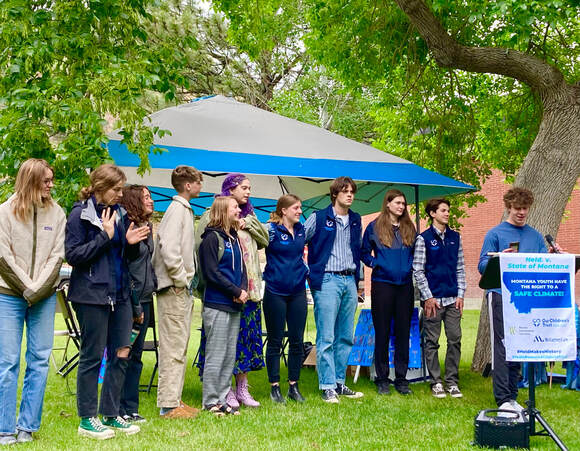
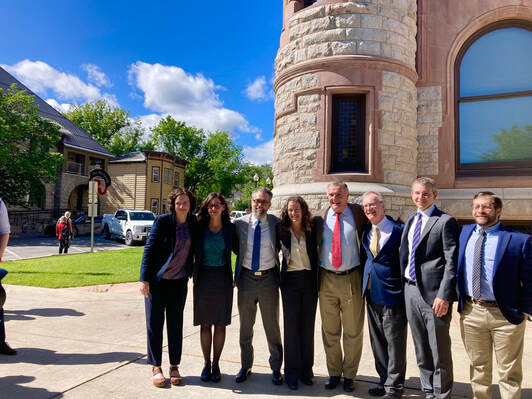
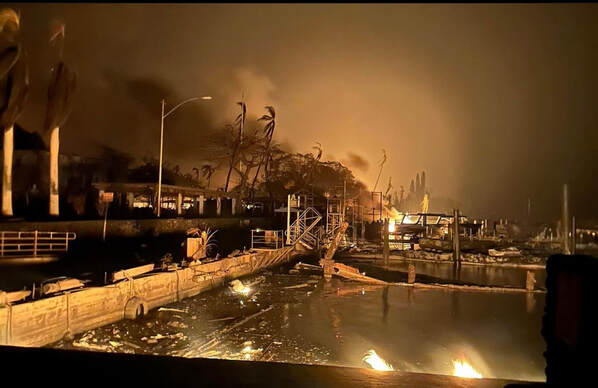
 RSS Feed
RSS Feed